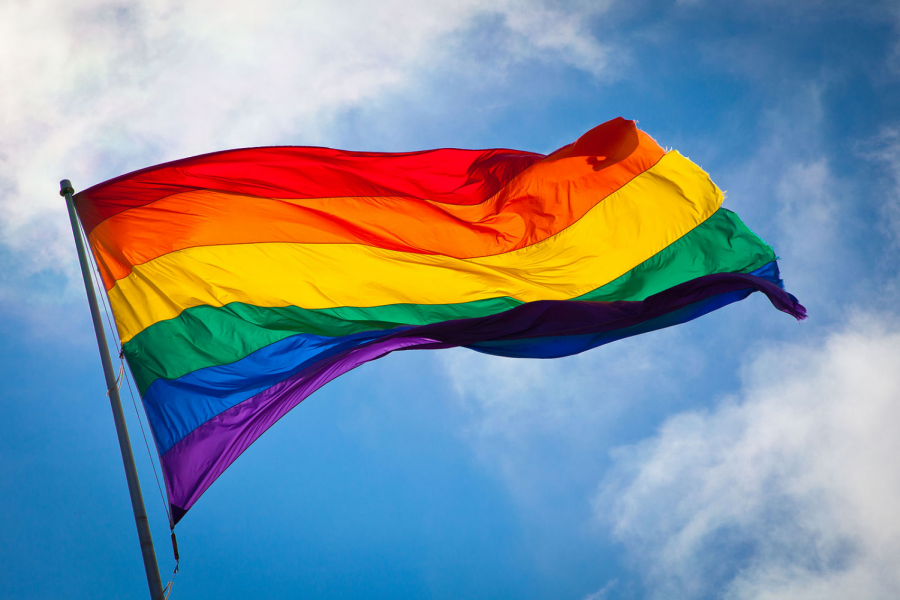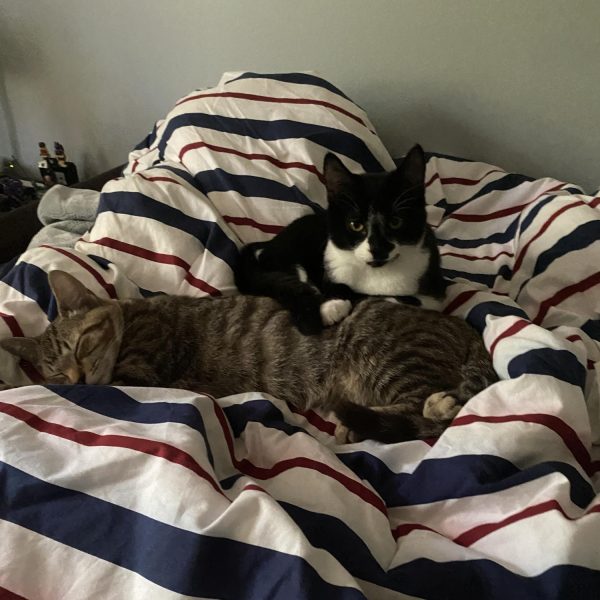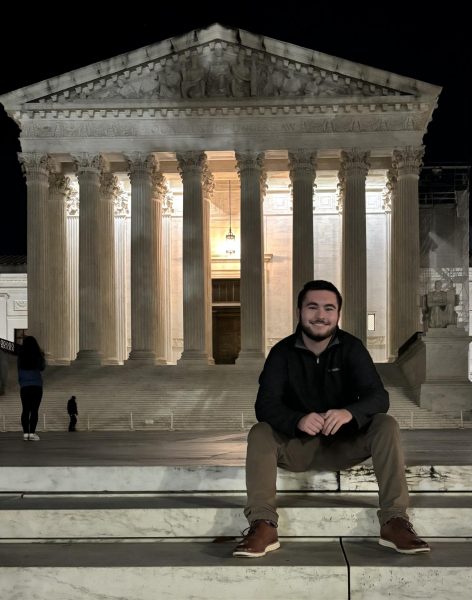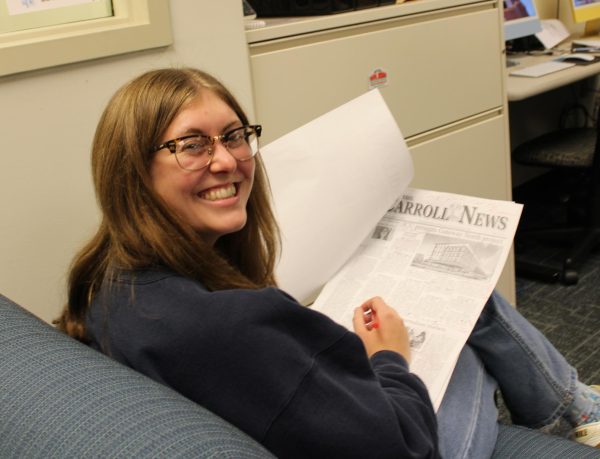Loud and Way too Proud
I rewatched “Monty Python and the Holy Grail” this weekend with a couple of friends. There’s this one scene where King Arthur is trying to talk to two peasants who are digging through a patch of mud, but one of them keeps interrupting the king to rant about the evils of monarchy (what a chump) and comparative virtues of an anarcho-syndicalist commune. Eventually, Arthur gets so frustrated that he grabs the man and yells at him to shut up. The man shouts “Help, help, I’m being repressed!” as Arthur backs away and gives up any hope of a rational conversation. (He had really just wanted directions.)
This scene reminded me of another joke I saw this past week — a little pamphlet called “Loud & Proud: John Carroll’s Diversity and Inclusion Focused Zine.” (I can only imagine that the abbreviation there is attributable to a crippling fear of the letters MAGA.) For about 30 pages, the (MAGA)zine’s various contributors — including students, faculty members and three drag performers — rant about how some scary conservative establishment (whose face is, of course, yours truly) is trying to repress them. But just like the peasant in the Monty Python skit, the issue isn’t that they’re being repressed; it’s just that nobody really wants to listen to them.
The pamphlet begins with an “Introduction, Explanation, and Forward” — I can only imagine they meant “foreword” — which quotes liberally from a column I wrote in the fall. (You can all guess which one.) The second page of this introduction essentially warns people that they shouldn’t read the (MAGA)zine if they don’t already agree with what it says, ending with a threatening, “This is our space,” in bold. Say what you will about my writing, but I’ve never once prefaced it with a warning that you’re not allowed to read it if you disagree with me.
A lot of the (MAGA)zine’s articles are just reprinted Letters to the Editor from The Carroll News, so I’d read most of the content already. One of the few original contributions is called “Do Better, JCU,” and written primarily by Lillian Perkins ’19. The piece claims that University administrators did not adequately or appropriately address the controversies in the fall. Hey, no argument here. If there’s one thing we can agree on, it’s the fact that the JCU administration is wildly, painfully, inexcusably incompetent. Here’s to finding common ground.
I didn’t really find any of the other opinion pieces interesting enough to respond to, but I would like to say a brief word about the “art” published in the pamphlet: It’s bad. One of the pictures is just a clumsily sketched rectangular rainbow titled “The John Carroll Experience.” Across from that masterpiece is a crooked picture of four arms of different colors (clever, edgy, pioneering) interlinked. A little later is a painting of a black fist under a rainbow crown under a flag, that looks like it came straight out of a kindergarten classroom. It’s called ‘Queer Royalty” — the narcissism is as appalling as the aesthetics.
And then there’s the poetry. Here’s a sample: “My mother speaks as if she wants to wash the rainbows off my hands, douse me in holy water. Thinking not wanting children is a choice or a blessing, or that loving women is all lilacs and cotton sheets.” And that’s one of the less cringe-worthy passages. This is what happens when you sacrifice real art for a shallow and incoherent ideology. This is what happens when art becomes nothing more than a juvenile expression of how an artist feels — an aesthetic theory that has become tragically commonplace in the years since art died. This is what happens when you make art, and everything else, about yourself.
And that brings us to our final point. One of the drag performers — a man with a thick beard who has chosen the unfortunate moniker “Peach Fuzz” — offered a quote for Loud & Proud, printed in rainbow text on a rainbow background next to a rainbow picture of the man himself (subtle): “Love yourself unconditionally. Because that takes the greatest amount of courage. Let that hold your power.”
My advice: Do anything but that. Our society is not suffering from any shortage of self-love. The subculture that felt the need to publish a whole magazine about how great they are — that only they are allowed to read — simply because someone wrote something critical of something they did, is certainly not suffering from any shortage of self-love.
What actually takes courage, and what we desperately need, is love of something higher than self. No great act of courage has ever been committed for love of self. No great work of art has ever been created for love of self. What love of self can give us is men dressing as women on a stage and mocking God, echo chambers on rainbow paper and a rabid fear of any call to anything more than a self-absorbed worship of our current broken state.








Morocco Mole • Apr 18, 2019 at 3:23 pm
Good opinion and well stated. Hateful.? Only for the thin skinned in safe space bubbles. Truth and disagreement isn’t hate. He’s not even bashing being LGBT, but like most in the real world, tired of the “in your face” bully Gaystapo and their many snowflake sycophants. Sorry, you’re welcome to your precious feelings, but not your own facts. Quit crying.
Anonymous • Apr 15, 2019 at 10:01 pm
I’m simply going to leave this here:
“Homophobia is more pronounced in individuals with an unacknowledged attraction to the same sex and who grew up with authoritarian parents who forbade such desires, a series of psychology studies demonstrates.
The study is the first to document the role that both parenting and sexual orientation play in the formation of intense and visceral fear of homosexuals, including self-reported homophobic attitudes, discriminatory bias, implicit hostility towards gays, and endorsement of anti-gay policies. Conducted by a team from the University of Rochester, the University of Essex, England, and the University of California in Santa Barbara, the research will be published the April issue of the Journal of Personality and Social Psychology.”
“Individuals who identify as straight but in psychological tests show a strong attraction to the same sex may be threatened by gays and lesbians because homosexuals remind them of similar tendencies within themselves,” explains Netta Weinstein, a lecturer at the University of Essex and the study’s lead author.”
“In many cases these are people who are at war with themselves and they are turning this internal conflict outward,” adds co-author Richard Ryan, professor of psychology at the University of Rochester who helped direct the research.”
anonymous • Apr 15, 2019 at 6:24 pm
As a catholic, I am disappointed by the fact that these such columns need to be written. JCU is a catholic campus and should not “bend the rules” to allow populations of students to take part in activities on campus that go against the teachings of the Church. To me its as simple as that. To take Mr. Leary to task for bringing such a circumstance to light is just ridiculious. I’m equally saddened to learn that members of the gay community have published a ‘zine that contains works that target Mr. Leary. Aren’t they doing the exact thing that they are accusing Mr. Leary of? And if they are so proud of this literary work, why is not available campus wide? Say what you will about Mr. Leary, at least he is not hiding anything.
Ben Dover • Apr 11, 2019 at 10:51 pm
As a Jcu student, conservative, and catholic, I am outwardly accepting of all. People are who they are and are all created in God’s image.I disagree with parts of this article, but I don’t believe we need too get a email from JCU every time Declan writes an article. Just stop being so soft.
z • Apr 9, 2019 at 10:55 pm
Lol can weirdo sheltered kids stop trying to write think-pieces? Like we get it Declan, your boy crush from prep school didn’t like you back and now Dalton from Phi Kappa Pi Beta isn’t into you either. It’s okay, just move on and mind your own business sweetie
anonymous • Apr 9, 2019 at 4:05 pm
This is the column that triggered a response email to the JCU community? After reading the replies to this article, it is amazing to see how coddled the minds of my peers are, and what little individual thought they have of their own. Hate! Hate! Hate! The only people expressing hatred are the so called SJWs and keyboard warriors attacking the author of this article for holding Normal conservative views.
It is also laughable to suggest that these words made the LGBT community feel frightened and fearful, which is what the useless bureaucrats at the Diversity & Inclusion office made clear by filling up our inboxes. Did this article call for students to throw others from the top of the clock tower? Did it result in physical or verbal harassment?
But in another way, this article did in fact make people feel sorrow, anger, and fear. If it doesn’t, it should.. Sorrow in that the university in which you attend, an institution designed to champion freedom of thought, knowledge, and truth, is attempting to shut down any views to the left of Stalin. You should feel angry that the administration of this school is filled with a bunch of cowards who believe that they can please everyone. You should feel frightened that this school, and so many that attend it, will go to great lengths to push their agenda, squash opposition, and bully others into submission. I know I do, hell, my response is anonymous*.
It doesn’t take a genius to realize that men are men, and women are women. Only an indoctrinated university student can convince themselves otherwise. But hey, free college for all, amirite?!!
Bronte Martin • Apr 9, 2019 at 3:19 pm
“At the same time, John Carroll University welcomes students and faculty from different religious backgrounds and philosophies. Dedicated to the total development of the human, the University offers an environment in which every student, faculty, and staff person may feel welcomed. Within this environment there is concern for the human and spiritual developmental needs of the students and a deep respect for the freedom and dignity of the human person.”
This is an excerpt from John Carroll’s mission statement and this article does nothing but make members of the LGBTQ community feel unwelcomed. This being posted and shared to all members of JCUs student body is going against the schools mission. To compare the LGBTQ community to “peasants” and all others as “kings” is misogynistic and frankly pathetic. I’m happy to see that your crooked beliefs are being drowned out by people who understand the bigger picture. That everyone should be accepted for who they are. I hope John Carroll stands by what they believe in and takes action to remove this hate speech from the Carroll News.
LOVEFORALL • Apr 9, 2019 at 3:04 pm
Why is it so hard for you and the “silent majority” at John Carroll to acknowledge that your “truth” might not be everyone else’s truth? There are students of all cultural and religious backgrounds at John Carroll who don’t agree with your hateful remarks. Stop offending people based on your view of the world which, obviously is very narrow.
Dan • Apr 9, 2019 at 2:44 pm
Kudos on you, you did a great job of almost disguising your hate speech as something elegant. You constantly make demeaning and hateful remarks at a group that has already faced and continues to face significant oppression. If yourself as white straight male were to face any type of adversity or challenges in your life, maybe you would have an ounce of understanding or empathy, but I won’t hold my breath waiting for that. You’re getting the reaction you want, inciting anger and hurting others, all in the name of religion. However, I suggest you take a second read over your beloved bible if you think this is what God taught. I can assure you it was not publicly attacking groups of people, because they make you feel uncomfortable. Isolating yourself and only surrounding yourself with other white men, seems to be the underlying cause for your insecurity and hostility. Try to speak to someone who comes from a different background or sleeps with the same sex, maybe you would learn a thing or two. Looking forward to your next article!
Silent Majority • Apr 8, 2019 at 1:30 pm
As a member of the silent majority here at JCU, I agree with all the truths articulated by Mr. Leary. It brings me much joy to see that someone is standing up for marriage and the biological and empirical truths of gender. God calls us to love one another. When it comes to someone who experiences same-sex attraction or gender identity disorder, the loving response is to tell them the truth. Just as a doctor wouldn’t give an anorexic person a liposuction surgery, so too should a doctor not mutilate someone who thinks that they are a different gender. In both cases, there is a physical and permanent response to a mental disorder. The underlying issue people are upset with is sex. Fornication, self-gratification, and sodomy are all sinful. All human persons are called to a life of chastity. Thank you for standing up to the sanctity of marriage, which by definition is between one man and one woman. Additionally, for standing up for science which tells us that gender and sex are essentially related. Godspeed and keep fighting for the truth.
Josh • Jun 6, 2022 at 1:10 am
So, do you experience “opposite-sex attraction?”
tia • Apr 8, 2019 at 9:50 am
It’s telling that Declan chose not to respond to the very thoughtful and factually based arguments concerning the first amendment and free speech made in the magazine to which he refers. As I’m sure he read (but couldn’t think of anything to say to,) the first amendment protects against STATE sanctioned speech–not private. Institutions like John Carroll have no obligation to platform speech such as his. Instead of facing these discussions head on, Declan has chosen to literally just complain about peoples’ emotionally driven poetry and art for 5 minutes, and make all of us read it too. thanks.
Antoinette Marinello • Apr 5, 2019 at 1:10 pm
What a disgrace on John Carroll university. The only thing I gathered from this article is that you’re too privalaged to acknowledge other people’s struggles. It’s sad seeing how ignorant some people can be and it truly reflect on your upbringing. Your parents should be ashamed that they conceived you, I sure would be! I would’ve loved to give you the benefit of the doubt but unfortunately it’s impossible. I guess this is the most I can expect from a tool named “Declan”. Do yourself a favor and keep your mouth shut.
Barry McCockiner • Apr 4, 2019 at 12:36 pm
What an absolute embarrassment for JCU. I understand freedom of speech but to openly bash a powerful and loving movement such as the LGBTQ parades, it’s upsetting and embarrassing. Whoever is in charge of letting the articles go on the website should be suspended, fined, or fired. Sickening.
Samantha Trolli • Apr 3, 2019 at 1:56 pm
To refer to “Loud & Proud: John Carroll’s Diversity and Inclusion Focused Zine” as a “joke” is an attack at every person who devoted their time this magazine. Imagine if someone referred to your work as a “joke.”
I respect every person’s opinion, but there is a difference between stating your opinion to intentionally irritate another and stating your opinion in hopes of a respectful conversation with another. Actions like this affect member and nonmembers of the LGBT community. One must understand people are people, imagine if a sibling of yours came out as a member within the LGBT community. Would you treat them with the same amount of disrespect as you did to John Carroll’s LGBT members? Or would you learn to love them as the person that they are? Think about this next time you try to degrade somebody or something for who and what they are.
Joe • Apr 3, 2019 at 1:44 pm
This article does nothing but promote homophobic and discriminatory views. John Carroll should be ashamed that they allow students to post such hateful content. What these people do in THEIR free time should not be any of your concern. It’s disgusting how offended you are by something you clearly know nothing about, proving your intolerance and hatred for others.
Colby • Apr 3, 2019 at 3:51 am
Damnnnnn as a conservative person this was way to far. There’s a difference between being respectful while stating an opinion verses being outright hateful towards a specific group….smh.
Greg Petsche • Apr 1, 2019 at 7:09 pm
Writing as an alumni who had this article forwarded to me. Freedom of speech is so crucial but the most important thing JCU taught me was the importance of understanding that my experiences were not universal. There’s a responsibility to those who exercise their speech to understand the power of their words and the impact they may have. I hope that the author finds time to talk to some of the people mentioned and especially those he didn’t feel were worthy of his thoughts (a little funny considering his comments on too much self love).
I say this because the movement around pride and self-love in the LGBT community is due to extreme lack of love for the people like me born into that community. When you spend your life hating a piece of yourself for so long and live with a constant echo chamber of that from the outside world, the pride movement was a welcome respite. It’s about more than accepting who you are, but actually loving who you are. There’s nothing threatening about it. Take some time and learn without judgement, that’s what your college years are about (and hopefully every moment after). Also, I highly recommend watching “Won’t You Be My Neighbor” as research. Here’s a quote from the best neighbor of all time: “As human beings, our job is to help people realize how rare and valuable each one of us really is, that each of us has something that no one else has – or ever will have – something inside that is unique to all time.” All the best, Greg (class of ‘13)
Joe Kleinmann • Mar 30, 2019 at 8:59 pm
It is incredibly cowardly of you to hide behind the facade of sophisticated word choices to try and mask your hateful beliefs (most likely instilled by your conservatively catholic parents, priests, Knights of Columbus colleagues, etc.) as intelligent arguments. I believe in the community of JCU, and I am glad your single, simple minded voice will continue to be drowned out by the many true Christians who believe we are all free to love who we love. I at least feel confident that you will not make it very far continuing to not only carry these beliefs, but portray them in such sloppy and embarrassing manner.
Brittany Ramsey • Mar 30, 2019 at 8:00 pm
I’m incredibly appalled that the Carroll News allowed this column to run. I used to write for this newspaper, and I can assure you this never would have been acceptable. It is not merely an opinion piece; it is hate speech. There is definitely a needed respect for freedom of speech, which I know is likely what has allowed this to be published, but John Carroll University also has a responsibility to its student body to make strides against hate and discrimination. I can say as a graduate, I never felt wholly comfortable coming out as gay while on campus. Having a column like this run and be supported by the school newspaper would have made me feel even more isolated than I already did at school. Was I loud and way too proud? No, more like forced into the way back of the closet by people like this. I encourage the queer community at JCU to continue to be out and be strong. You are heard, and you deserve to continue to be heard.
Anonymous Alumni • Mar 30, 2019 at 6:28 pm
You should be ashamed of yourself. How sad that you have so much hate in your heart. You will surely get what’s coming to you and I can only imagine that it will be misery and loneliness. As a John Carroll alum, I expected better of the university. It seems you really hate the school so why don’t you just leave? Shame on you.
James Kirkpatrick • Mar 29, 2019 at 5:38 pm
If your goal is to effectively advocate in favor of your opinions, I think you’ve missed the mark. Masking this piece as mere ‘criticism’ is thinly veiled – it is hateful. It seems to me that a strong sense of ‘self-love’, especially in communities that have historically been on the recieving end of this type of hate, finds its roots in reaction to rhetoric such as this. If you truly wanted to influence the change you say you’d like to see, you’d know it is not done in this manner.
Pete Beezookoff • Mar 29, 2019 at 3:19 pm
The kid who couldn’t cut it as a priest is back at it to bash LGBT people. What a fight and what a waste. Attempting to grab the attention of shock-jocks and grifters alike—all to the hemorrhaging of the laity of the Catholic Church in the United States. What bad faith. Keep blaming LGBTs for systemic issues that have rocked our Church. It’ll be for naught.
John Goode • Mar 29, 2019 at 12:17 pm
I’m confused by some of the whining. I can applaud the author having opinions and taking a stand, but I don’t follow the author’s victim mentality around the state of his university. It seems that the administration is in a bad state in the author’s eyes. Attending a private university is an expensive consumer choice, and there are always other places to take your money – why not exercise the free market instead of being a victim?
Kristi McCann • Mar 29, 2019 at 8:47 am
What a hateful article. There was really nothing else you could’ve written about?
PS: You must have missed the memo— God loves all his children. Yes, even the gays.
Natalie Gamble • Mar 28, 2019 at 9:50 pm
How much longer until the Carroll News creates an official anti-LGBT hate column?
Buck Turgidson • Mar 28, 2019 at 11:13 am
houston we have a bruh moment
Jimmy Desmarteau • Mar 27, 2019 at 12:26 pm
Elegantly written as usual. Yet another amazing article from Declan.